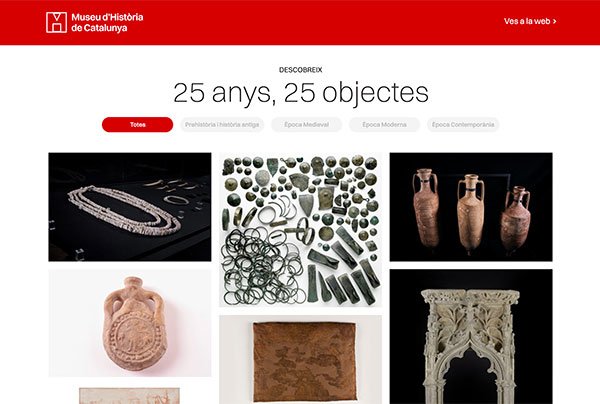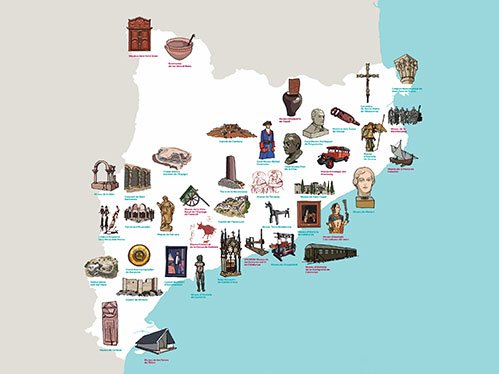Al canviar d'idioma no tots els continguts estan traduïts
The website is not fully translated
Al cambiar de idioma no todos los contenidos están traducidos
Al canviar d'idioma no tots els continguts estan traduïts
 Opening times
Opening times
 Location
Location
 Tickets
Tickets
 Admissions
Admissions
Opening times
Tuesday to Saturday, 10am to 7pm
Wednesdays, 10am to 8pm
Sundays and public holidays, 10am to 2.30pm
The ticket office and entrance are closed 30 minutes before closing time
CLOSED: Mondays that are not bank holidays, 1 and 6 January, 1 May, 18 May, 1 June, 25 and 26 December
Location
Address
Plaça de Pau Vila, 3
08039 Barcelona
Coordinates: 41.380900, 2.185693
Contact
932 254 700
mhc.cultura@gencat.cat
Fax 932 254 758
Group and school bookings:
932 254 244
Monday to Thursday: 10am-2pm and 3.30-5.30pm
Friday: 9.30am-2pm
mhcvisites.cultura@gencat.cat
Transport and access routes
Public transport
Buses V17, H14, D20, V15, V13, 39, 45, 51, 59 and 120
Metro L4 (yellow) Barceloneta
Train to Barcelona Estació de França
Barcelona Tourist Bus: red line; and Barcelona City Tour: eastern route; Museu d’Historia de Catalunya stop.
Parking
There are three paid-for car parks nearby: in Passeig Joan de Borbó, Moll d’Espanya and Moll de la Fusta.
Coaches have parking spaces available near the museum building.
“Bicing” bicycle hire in Plaça Pau Vila.
Admissions
Permanent exhibition
Temporary exhibitions
General admission: 4 euros
Reduced admission: 3 euros
Combined ticket
Permanent exhibition + temporary exhibition
General admission: 8 euros
Reduced admission: 6 euros
 Opening times
Opening times
 Location
Location
 Tickets
Tickets
 Admissions
Admissions
Opening times
Tuesday to Saturday, 10am to 7pm
Wednesdays, 10am to 8pm
Sundays and public holidays, 10am to 2.30pm
The ticket office and entrance are closed 30 minutes before closing time
CLOSED: Mondays that are not bank holidays, 1 and 6 January, 1 May, 18 May, 1 June, 25 and 26 December
Location
Address
Plaça de Pau Vila, 3
08039 Barcelona
Coordinates: 41.380900, 2.185693
Contact
932 254 700
mhc.cultura@gencat.cat
Fax 932 254 758
Group and school bookings:
932 254 244
Monday to Thursday: 10am-2pm and 3.30-5.30pm
Friday: 9.30am-2pm
mhcvisites.cultura@gencat.cat
Transport and access routes
Public transport
Buses V17, H14, D20, V15, V13, 39, 45, 51, 59 and 120
Metro L4 (yellow) Barceloneta
Train to Barcelona Estació de França
Barcelona Tourist Bus: red line; and Barcelona City Tour: eastern route; Museu d’Historia de Catalunya stop.
Parking
There are three paid-for car parks nearby: in Passeig Joan de Borbó, Moll d’Espanya and Moll de la Fusta.
Coaches have parking spaces available near the museum building.
“Bicing” bicycle hire in Plaça Pau Vila.
Admissions
Permanent exhibition
Temporary exhibitions
General admission: 4 euros
Reduced admission: 3 euros
Combined ticket
Permanent exhibition + temporary exhibition
General admission: 8 euros
Reduced admission: 6 euros
The Civil War
Battle of the Ebro trench (36)
The uprising by the army against the government of the Second Spanish Republic on 17 July 1936 marks the outbreak of the Civil War. The south-eastern part of Spain falls to the rebels, with the support of the most conservative sector. Elsewhere the coup is foiled thanks to the cooperation between the forces of order loyal to the Republic and the trade unions.
The war drags on for three years and has severe effects on the civilian population. Problems of supplies are compounded by confrontations between the different political and trade union forces, as well as the bombing of the civilian population, especially by Hitler’s and Mussolini’s air forces, which support the rebel side led by Franco.
In December 1938, after the defeat of the Republican army in the Battle of the Ebro, Franco’s troops occupy Catalonia. More than 450,000 people are driven into exile across the French border, fleeing repression by the regime. Some find shelter in other countries, but most remain in France. With the outbreak of the Second World War, former Republican soldiers join in the defence of France and thousands of them end up in Nazi concentration camps. They are not acknowledged by the Spanish government.

Opening times
Tuesday to Saturday, 10am to 7pm
Wednesdays, 10am to 8pm
Sundays and public holidays, 10am to 2.30pm
The ticket office and entrance are closed 30 minutes before closing time
CLOSED: Mondays that are not bank holidays, 1 and 6 January, 1 May, 18 May, 1 June, 25 and 26 December
Location
Address
Plaça de Pau Vila, 3
08039 Barcelona
Coordinates: 41.380900, 2.185693
Contact
932 254 700
mhc.cultura@gencat.cat
Fax 932 254 758
Group and school bookings:
932 254 244
Monday to Thursday: 10am-2pm and 3.30-5.30pm
Friday: 9.30am-2pm
mhcvisites.cultura@gencat.cat
Transport and access routes
Public transport
Buses V17, H14, D20, V15, V13, 39, 45, 51, 59 and 120
Metro L4 (yellow) Barceloneta
Train to Barcelona Estació de França
Barcelona Tourist Bus: red line; and Barcelona City Tour: eastern route; Museu d’Historia de Catalunya stop.
Parking
There are three paid-for car parks nearby: in Passeig Joan de Borbó, Moll d’Espanya and Moll de la Fusta.
Coaches have parking spaces available near the museum building.
“Bicing” bicycle hire in Plaça Pau Vila.
Admissions
Permanent exhibition
Temporary exhibitions
General admission: 4 euros
Reduced admission: 3 euros
Combined ticket
Permanent exhibition + temporary exhibition
General admission: 8 euros
Reduced admission: 6 euros




 Twitter
Twitter Facebook
Facebook